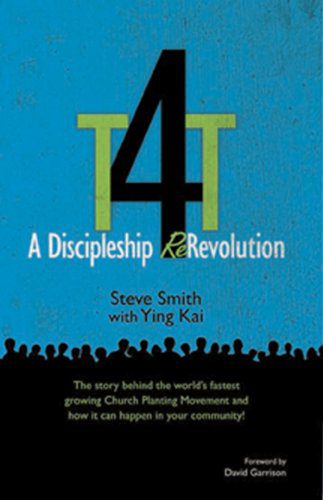Few recent missiological articles are as practical and pleasurable as is George Terry’s “A Missiology of Excluded Middles: An Analysis of the T4T Scheme for Evangelism and Discipleship” (Themelios, Aug 2017). I would be hard pressed to improve upon Terry’s own summary. He writes,
This article analyzes the theological premises of the popular T4T model for evangelism and discipleship.
The analysis argues that the T4T scheme largely depends on several false dichotomies that do not engage the Scriptures except in order to proof text and it regularly excludes the middle area that conveys the biblical balance.
The result is an overly rigid methodology that undervalues the influence of context in cross-cultural communication. Rather than a theological vision that holds in biblical tension both truth and context, T4T sanctions an inflexible evangelism scheme that is more conducive to receptive audiences and a discipleship model that is more conversant with what is expedient than what is biblical.
He delivers on the promise made in the article abstract.
Characteristic Features of T4T
Whereas I’ve critiqued the use of Scripture in T4T (& similar methods), Terry provides a theological analysis; yet, his article differs markedly from others.
First, his comments are specific and shrewdly focused. They target the most significant aspects of T4T, without which T4T and similar methods cease to exist. Accordingly, he challenges four of T4T’s core values:
- broad and indiscriminate seed sowing,
- the gospel as the filter for finding receptivity,
- obedience-based discipleship, and
- the ministry of the Spirit as Teacher
Although T4T advocates have the rhetorical advantage (who does not think disciples should be obedient?), Terry exposes the reality: “T4T is dependent on a series of dichotomies that do not accurately portray the fuller biblical picture” (p. 350).[1]
 For example, T4T advocates dependence on the Spirit by fostering “antipathy toward knowledge or expertise” (350). Likewise, T4T suggest disciples either seek indiscriminate evangelism and rapid church planting or they are passive and disobedient (cf. 341, 347–48).
For example, T4T advocates dependence on the Spirit by fostering “antipathy toward knowledge or expertise” (350). Likewise, T4T suggest disciples either seek indiscriminate evangelism and rapid church planting or they are passive and disobedient (cf. 341, 347–48).
Perhaps most difficult to understand is why T4T dichotomizes life with the Spirit and having Jesus’ presence (349). The latter is seemingly equated with merely “learning the theological content or the rationale of Christian faith” (349).
Not only does Terry carefully support his claims with citations, he astutely highlights many non-sequiturs that plague T4T-like schemes. For instance, “the fact of the unpredictability of the Spirit does not logically infer the need for indiscriminate evangelism” (338).
Indifference to Culture and Contextualization
Second, few critiques of T4T-schemes consistently and thoroughly explore implications for contextualization. In a word, Terry writes, “T4T’s strong emphasis on indiscriminate evangelism devalues the need for establishing trust and for learning how to communicate effectively in cross-cultural situations” (341).
He reflects on why some people reject gospel presentations. They either do not understand the message or lack the necessary biblical and relational context. Terry says,
“[Steve] Smith affirms addressing the basic worldview of the context, but he oversimplifies it. T4T unintentionally discounts the reality that some people who reject an abrupt and uniform presentation of the gospel may nevertheless be open to the gospel when it is conveyed in a more culturally informed manner and in the context of a relationship of trust.” (342)
T4T’s blatant disregard to contextualization is most evident in its advocating a single evangelistic methodology. Thus, “…the T4T approach portrays evangelism as a methodologically unvarying endeavor and insufficiently recognizes the importance for contextual diversification” (342).
Furthermore, Terry illustrates a point I often harp on: contextualization begins with interpretation. In T4T, Smith translates “all nations” (in Matt 28:19) with a gloss “everyone.” Therefore, readers miss a fundamental part of the vision found in the Great Commission (e.g., “the worldwide scope of the church’s mission” and its basis in the Abrahamic covenant).
Terry adds,
“The commission is concentrated on people as part of the nations, not as isolated individuals. This is not to say we are not concerned for individuals; rather, our concern for individuals recognizes their unique history and context…. Since the ethnicities define the scope of God for the establishment of his kingdom, evangelism should be anything but indiscriminate” (340).
One must appreciate how Terry helpfully demonstrates the way various issues are intertwined.
Consider the Consequences
Third and finally, readers consider the unintentional consequences of using T4T and similar approaches. Terry sprinkles examples throughout his article.
For instance, T4T trainees implicitly learn to devalue any biblical instruction that does not lend itself to immediate application. T4T seems to suggest that new believers do not need “hard to understand” instruction (cf. 2 Pet 3:16) in order to understand the deep truths of God and apply ancient Scripture to contemporary situations.
As suggested above, a lack of contextualization can lead to people rejecting the message they hear due to its incomprehensibility. On this point, I’ll close with one of my favorite quotes from the article:
This T4T premise underestimates the formative influence of worldview and discounts a major anthropological factor related to decision-making.…
People do not make decisions, especially life changing ones, in a vacuum, as isolated individuals, completely disconnected from the sociology of their environment. Choices people make are filtered through the network of all the informative presuppositions, beliefs, and values of a worldview that has been shaped by life experience, by culture, and by their social context. Life changing decisions normally occur in the context of relationships of trust. (343)
Read the entire article and tell me what you think. Any of this resonate with your own experience with various church planting methods?
[1] Hence, the “excluded middle” referenced in the article’s title.

















